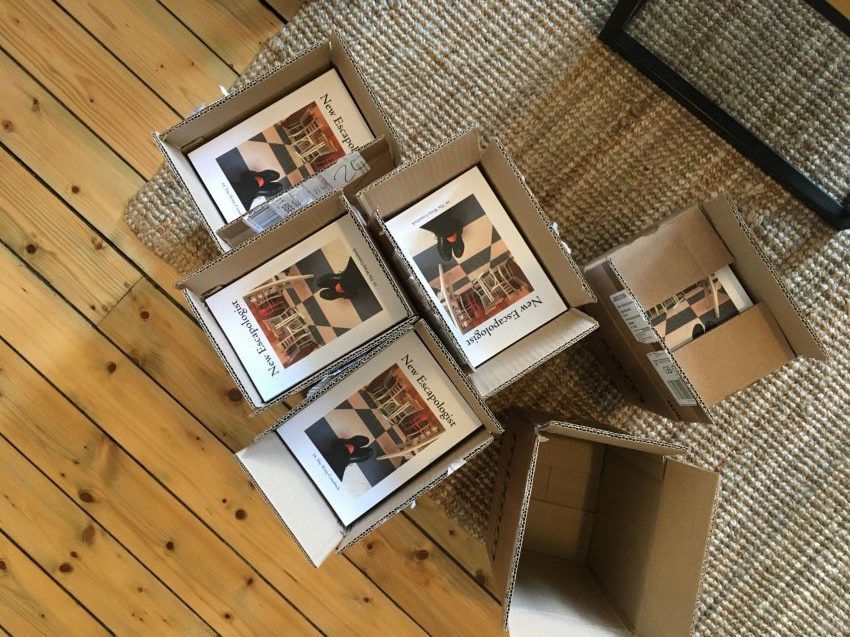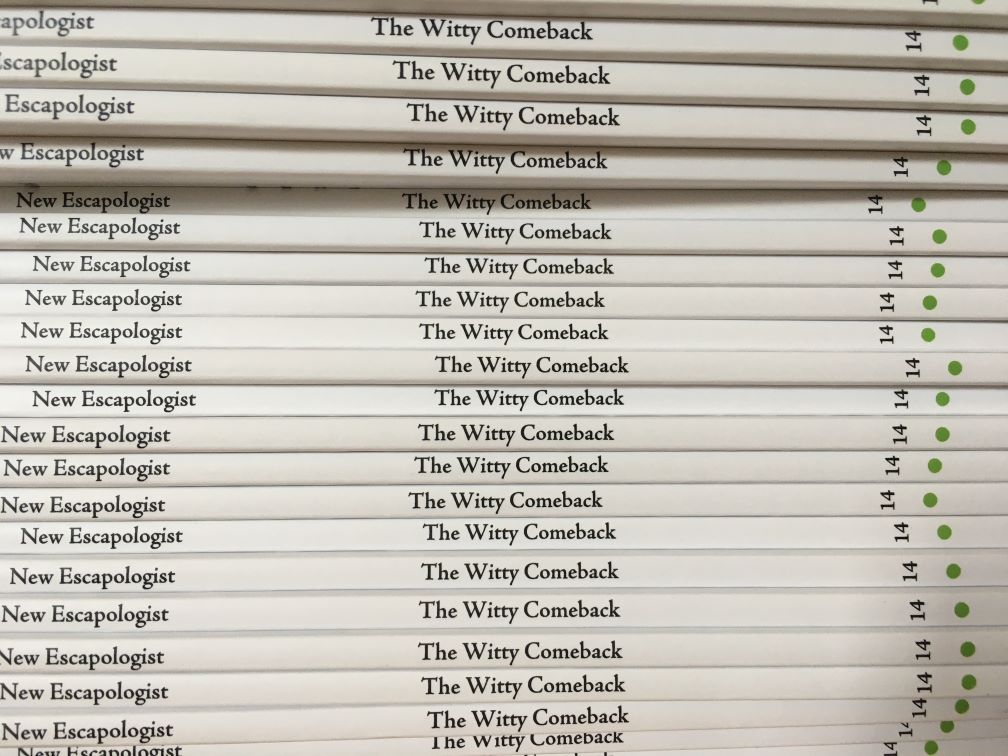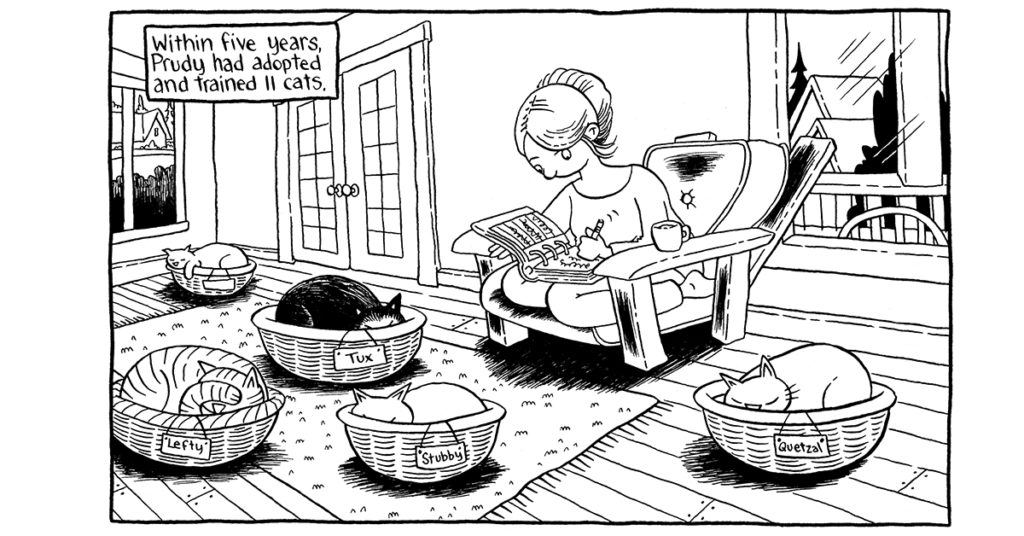Epub Blues

Some of our digital editions (in the epub format) don’t read very well on certain devices. Sigh.
You might have seen an error screen like the image above instead of a nice cover page. You might also get problems with some of the line breaks.
To this I say: Grr.
For much of our original run, people would ask after digital editions. For a long time I said “NO! There will be no digital edition under any circumstances! New Escapologist stands against screens and electronic gizmos.”
To which some people would say: “But what about minimalism?”
To which I would say: “I see what you mean but even minimalists own some books. Have our periodicals among your treasured possessions. Or pass them on once you’ve read them. Ebooks are the devil’s dinner.”
But then others would say: “For me it’s about access. I can’t read the printed page. I need to be able to zoom in on the text.”
To which I would mumble: “mm, okay, fair enough.”
I don’t want to exclude anyone from our blistering wit and wisdom. So I made our future editions and back issues available in PDF. For minimalism and for access.
But even then, some people said they wanted epub since this is apparently the best format for embiggening text and hopping between items in a table of contents. Honestly, Gutenberg didn’t have to contend with any of this.
This time around, in advance of Issue 14, I tried to get the epub format nailed down, despite not really understanding or liking or believing in it. This is why there are errors. I’m not entirely sure what to do now.
I’m tempted to offer PDF as the only digital format from now on. They work on every device so far as I know and they have the happy bonus of displaying the work as it’s supposed to look. A lot of thought goes into the design of the print editions, you know, and the epub format strips all of that thought and craft and beauty away.
On the other hand, I don’t know if PDF meets the accessibility requirements of most people who need it or if it can have the metadata useful to digital library platforms.
What do the digital media preferers among you think? Here’s a quick survey, open for the next month.
The Escape of Ariel Anderssen
This one’s a bit NSFW (though the idea that anything on this site might be “safe for work” is obviously hilarious) so by all means skip this one if you can’t be doing with sauce. The story was fit to print in the Guardian though, so we’re not talking about anything red hot. And there are no pics in this post, only text.
Ariel Anderssen escaped the Jehovah’s Witnesses as a teen. And then grew up to become a BDSM model.
The piece doesn’t go into detail about how she escaped (I think her family might have just left) but the world of the JW’s sounds pretty restrictive:
Dressing modestly was important. I learned that masturbation was wrong many years before I found out what it actually was. Men were the heads of our households, and women weren’t allowed to pray out loud, address the congregation, or even handle the microphones we used at our meetings.
At nine years old, I knew that oral sex, gay sex and extramarital sex were all just as sinful as blood transfusions. My future stretched ahead of me, into eternity, hemmed in on all sides by rules.
I knew a Jehovah’s Witness once. As teenagers, we worked together in a video store. She was engaged to be married, which meant she’d soon have to quit the job and become a stay-at-home wife. Given my famous aversion to work, you might be surprised to hear I found this a tad depressing. She was a driven, energetic, social person and I couldn’t imagine her nursing babies at home all day not by choice but because a fringe denomination of Christianity demanded it of her. No amount of hinting at the alternatives (okay, lurid and imaginative flirting) on my part could change her mind. She seemed happy enough in her church.
Ariel, evidently, was not. And the world she escaped into was thrilling but confusing:
my new world spun with giddy freedoms. Skateboarding on Sunday mornings, my first pair of jeans, trying out swearing like my school friends. But with the freedom came uncertainty. If the JWs had been wrong, how could I trust anyone to tell me how to live?
One day, on seeing an exhibition of erotic art at a gallery, she moved into BDSM modelling. Ironically, through a creative practice that involved being tied up, she found freedom, personal agency, and even love.
Ariel has written a book. I’m certain there will be a movie version eventually. I mean, there’s got to be, right? From restrictive orthodoxy to liberating creative practice via literal bondage, if this is not a tale of Escapological victory, I’m not sure what is.
*
A Treat for Future You
I used to listen to a comedy podcast called The Parapod. It was about the paranormal and presented by two comedians: one a believer in any old rubbish and the other a rational sceptic. The believer, Barry Dodds, was generally ridiculed as a gullible thicko even aside from his belief in El Chupacabra.
It was always very funny and Barry was a good sport. But, baseless belief in vampires aside, I was often left thinking “but, Barry’s got a point there. It was just a bit strangely articulated.”
On one memorable occasion, he described making tea before bedtime and putting it in a Thermos for the morning. He described it as “a treat for future me.”
This was good ammunition for his opponent who ridiculed him for thinking in those terms. Most people would, for example, fold their laundry without thinking of it as “a treat for future me.”
But getting things done sort of.. is a treat for future you. Isn’t it?
Getting things done today improves your life (or the lives of others) tomorrow.
Celebrated wise man and New Escapologist columnist David Cain picks up the subject at his blog today. He does not use the phrase “a treat for future me” because he’s more articulate than poor Barry. Instead, he writes:
Imagine you’re having a hard day, and you get home to find that someone has left dinner for you. It’s exactly what you wanted. Lasagne! Or maybe green curry, or tacos. […] Of course, this thoughtful benefactor could be you, just earlier.
He goes on to give more significant examples than lasagne or a Thermos of tea. Perhaps you past self wrote a book or got a degree or invested some money. They did something difficult for you. If you’ll pardon my weak pun, it’s a present for the future.
Anyway, David also says:
This sort of inheritance represents real wealth — consisting of personal freedom, money, resources, skills, relationships, and overall well-being — and you can pass it on to yourself.
The whole post is interesting and worth reading. He explains the “catch” of having to do things now in order to benefit from them later. And how to actually do the difficult thing of doing. But what interests me as an Escapologist is his definition of freedom.
He’s right. It’s real freedom. The only reason my days aren’t a living Hell today is that I put in the legwork yesterday and the day before and ten years ago. Rarely does a day at Escape Towers see an act of manic brinkmanship: I take everything in my stride and, largely, do what I want went I want to do it. I am the inheritor of many, many treats for future me.
Compare and contrast this idea of freedom with what Joan Didion once observed about the American idea of freedom (in Slouching Towards Bethlehem, 1968) via their then-idolisation of multimillionaire Howard Hughes:
That we have made a hero of Howard Hughes tells us something interesting about ourselves […] that the secret point of money and power in America is neither the things that money can buy nor power for power’s sake (Americans are uneasy with their possessions, guilty about power, all of which is difficult for Europeans to perceive because they are themselves so truly materialistic, so versed in the uses of power), but absolute personal freedom, mobility, privacy. It is the instinct which drove America to the Pacific, all through the nineteenth century, the desire to be able to find a restaurant open in case you want a sandwich, to be a free agent, live by one’s own rules.
I think it’s possible in 2023 to get those wires crossed. I think people today idolise the Kardashians (who whoever it is now) because, on some level, they’re hungry for Didion’s “absolute personal freedom, mobility, privacy” but getting caught up on the material wealth they see on the screen or how their bodies look compared to theirs. I could be wrong. But it’s what I suspect.
So be like David Cain and Barry Dodds: send presents to the future — treats to future you — in order to maximise your freedom, not the material things or the power that money can buy. Those are dubious treats for future you.
*
For further meditations on freedom versus The Trap, subscribe today to New Escapologist magazine.
Stayin’ Alive

This is boring news but… we changed our business model. I want to explain why and, who knows, maybe some of you will be interested in this behind-the-scenes glimpse into an Escapological business practice.
In the old days of the magazine (Issues 1-13), we used a print-on-demand service to satisfy every single sale. Well, the first fifty or seventy copies were delivered to my flat and I’d personally ship those ones to subscribers. But after that, an order would come in for a single issue and I’d essentially forward that order to the printing service.
The main advantage of fulfilling orders this way was that I didn’t need to hold inventory. I was very mobile at the time, flitting between Glasgow and Montreal and also travelling a lot, so boxes of magazine stock would have been quite the encumbrance.
The main disadvantage, however, was that it didn’t make any money. The profit margin on a £6 issue was maybe £1.50. So if I sold, say, 200 copies, I’d “make” £300. This would usually go towards printing the next batch of subscriber copies. We always said “New Escapologist makes no money” and it was true.
This time around, I want to make a small amount of money from the magazine. For myself, that is, not for a company or anything. It’s very, very hard to make money from books or magazines and the effort I put into it all is stupendous. Don’t get me wrong, I enjoy it all, but I need about £6,000 of income a year to stay alive and it makes sense for that money to come from my bookish exertions and not from some stupid day job that would take time away from the core operation of book- and magazine-making.
So that’s my aim. To make the £6,000 (from New Escapologist and from my books) I need to stay alive. What a grubby little Capitalist I am, eh? In between my self-financed meals, I will be rolling in pence.
As such, the old print-on-demand model is no good. I need to print hundreds of copies in advance so that the cost-per-copy is about £2 and then sell them at £9 for a £7 profit. It might actually work, though of course it remains to be seen.
I expect to sell 300 copies of each issue. 300x£7 is £2,100. Twice per year is £4,200. The remaining £1,800 (and hopefully a little more) will come from sales of my books.
So there we go. That’s why we changed the business model (or maybe just the “printing model”) and why, eventually, issues from 14 onwards will eventually go out of print. Just like other magazines.
I don’t think I’ve ever spoken so candidly about money and how that works here at Escape Towers. But I wanted to be transparent for a moment, to show you where the money goes, to show you how it all works. I don’t get rich, I make just enough to live on. And I wouldn’t have it any other way. Anything other than subsistence farming is, in my view, a waste of time.
Frugality and minimalism make things viable (and ethical) on the outgoings front, while these sort of exertions (writing, editing, printing, schlepping to the Post Office every couple of days) take care of the income. The rest of life involves recumbent positions.
Thanks to everyone who has supported New Escapologist‘s return and therefore my ability to carry on doing this. Here’s where to go if you’d like to subscribe or buy a single issue. There’s maybe 100 copies left!
Letter to the Editor: Roko’s Basilisk
To send a letter to the editor, simply write in. You’ll get a reply and we’ll anonymise any blogged version.

Hi Robert,
We are really pleased New Escapologist is returning to print – Can’t wait 🙂
Just a quick question about AI and your closing comment in response to the algorithmic poetry examples. You said: “We’re doomed. I for one welcome our new sonnet-writing computer overlords.”
Was this a reference to Roko’s Basilisk?
I read that some Silicon Valley libertarians and “crypto bros” are well into this theory.
Thank you for all your articles and books.
We are big time Robert Wringham fans in our house!
Warm Regards,
N
*
Hello N,
What an excellent question! Alas, my attempt at a cultural reference was even lower brow than that:
Thanks for the nice things you said. Not much longer to wait for some ways to subscribe or buy the first issue. In fact, it’s available now.
RW
Shipped-shape
Everything is shipped. By which I mean the all-new Issue 14 and any books you might have ordered at the same time. Thanks again for supporting the return of the mag.
Yesterday, I hand-delivered three copies to unsuspecting subscribers in Glasgow while 160 other copies sat in the post office, ready to go.
The remaining overseas copies were shipped this morning.
Digital editions went out yesterday via Kickstarter’s messaging system.
It’s on!
There’s no need to tell me when your copy arrives but if there’s anything wrong with say, the packaging or a magazine’s non-arrival a few weeks from now, please let me know.
Let It Rot
“Let it rot” is the fructating new name of the Chinese phenomenon in which young people stop working and just lie down.
They refuse to work, refuse to start a family, refuse to engage with the economy beyond spending what is required for staying alive.
They changed the name because the Chinese government censored any social media using the movement’s former name.
Here’s a ten-minute video about the “Let it Rot” movement and why young Chinese people are giving up and dropping out.
A Shipping and Shopping Update

Phwoar! Look at all those lovely magazines. I have 250 of them in my tiny Glasgow flat at Escape Towers, ready and waiting to be shipped. It’s going to be a busy couple of days.
If you missed the Kickstarter or you were waiting for a more direct way to subscribe or buy the new issue, now’s your time to shine.
Remember that there’s a fiver off The Good Life for Wage Slaves as well. Use coupon code WAGE5.
Shipping announcement:
I’ve been promising to ship on 10th August (this Thursday) but Kickstarter haven’t actually sent us any money yet. Shipping hundreds of mags before being paid for them would be a significant financial risk so I may have to wait a couple more days before shipping them. They’re ready to go though and I’m looking forward to getting them into your hands.
Shop news:
There were some teething troubles at the overhauled shop, though I have hopefully fixed them. The problem seemed to be with PayPal. If PayPal still doesn’t work for you at checkout, please know that you can also order by credit/debit card or even by direct bank transfer. Please see the various options available.
If PayPal doesn’t work but it’s still your preferred way to pay, you can send your payment to me directly through PayPal instead. I’ll know from the amount of money what you’re ordering and I’ll treat it the same as any other order. Sorry for the palaver.
Here’s where to go if you’d like to be in the first batch of mags being shipped.
Catfood Omelettes

This is from the introduction to a 1998 comic called Queen of the Black Black by Megan Kelso:
I plan to be drawing comics when I am an old, old, woman, barring early death or a freak accident. Maybe I’ll own a skating rink or maybe I’ll be living on catfood omelettes in a damp basement apartment, but I WILL be making comics.
Such gorgeous integrity. I really admire the the certainty, the commitment, the ability to look sacrifice in the whites of the eyes. An aspiring or struggling creative person could take strength from this today.
Kelso, needless to say, is still making comics.
When I searched around the quote this morning I found it in full, quoted back to her, in a 2011 interview. The interviewer asks if she still feels that way “now”. Kelso:
My young self made a vow that my older self feels obliged to keep. I sometimes wonder if that very public vow I made is part of what has kept me at it. However, I love making comics as much if not more than I did back then, so I think I would’ve kept at it even if I hadn’t proclaimed it from the hilltops the way I did. I fear I’m going to be more on the catfood side of things than the skating rink side, but yes, I still believe it.
You can take it from me as well. There may be twists and turns in the road, times you feel foolish or low, but commit (and accept the catfood omelette contingency) and you’ll succeed. You might not become mega-famous or super-rich (dubious prizes anyway) but you’ll still be doing your thing instead of something you despise. And that’s Escapology.
*
A Humanistic Sickness
“About 70 percent of people,” says Dan Cable, “are not engaged in what they do all day long, and about eighteen percent of people are repulsed.”
18% is a lot of people.
Cable is the Professor of Organizational Behaviour at the London Business School. As such, he unsurprisingly frames this repulsion as bad for worker motivation and productivity, but he also describes it as “a humanistic sickness.”
He traces the root of the disengagement/repulsion problem to the beginning of the twentieth century:
Each of the people in [a shoe shop] would watch the customer walk in, and then they’d make a shoe for that customer [but a few years after the Industrial Revolution] we got this different idea, as a species, where we should not sell two pairs of shoes each day, but two million.
As we know (read my books!), this led to Taylorism: the separation of “head and hand” and the division of work into smaller (and increasingly meaningless) sub-tasks. One person stitches the sole of those shoes, another stitches the heel, another threads the laces, and so on. We became a Big Machine, workers became alienated from their work or to lose sight of bigger pictures, and our daily activities lost meaning to the point where 70% are not engaged and 18% (the most likely Escapologists among us) are “repulsed” by it. Well done, Capitalism.
As Cable explains in the video, this way of working isn’t good for the way our biological brains evolved. Humans need novelty, we need change, we need problems to solve. We also, I’d add, need to be able to take a sense of pride in our crafts and to enjoy the moment of finishing a meaningful task.
The relevant part of the brain, Cable says, is called the ventral striatum and it’s forever “urging us to explore the boundaries of what we know, urging us to be curious.”
This ventral striatum, especially here in the 21st century, will remain unsatisfied if we don’t escape into what, a few months ago, we called “the right kind of work.”
It may or may not involve making shoes.
How will you make that escape? Alternatively, how did you make that escape? Let me know. New Escapologist, in its return to print, will have space devoted to such stories. Tell them to us. Tell them to your community: the rest of the 18%.



